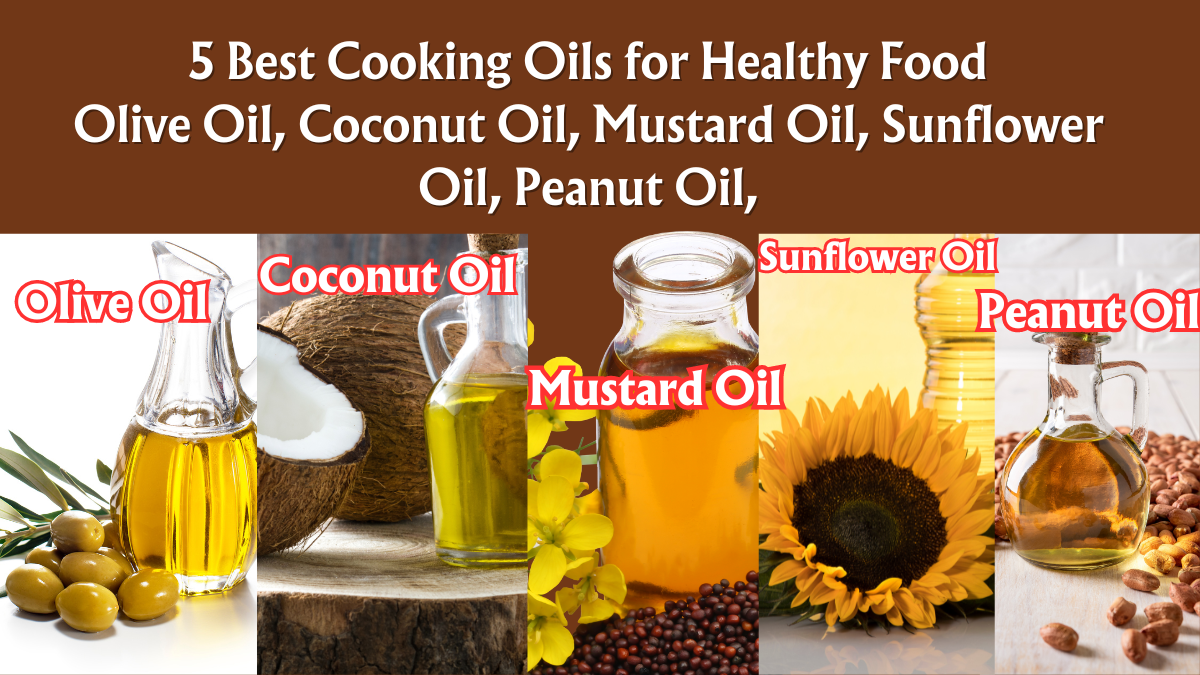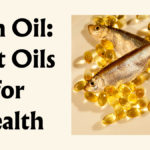5 Best Cooking Oils for Healthy Food, Source, and Benefits (Part 5) Olive Oil, Coconut Oil, Mustard Oil, Sunflower Oil, Peanut Oil,
Olive Oil: Best Cooking Oils for Healthy Food, Source, and Benefits
Olive oil, often referred to as the “liquid gold,” has been a culinary staple for centuries. Renowned for its rich flavor, versatility, and numerous health benefits, olive oil is a cornerstone in kitchens worldwide. In this article, we’ll explore the sources, benefits, and diverse applications of olive oil, shedding light on why it remains a top choice for both chefs and health-conscious individuals.
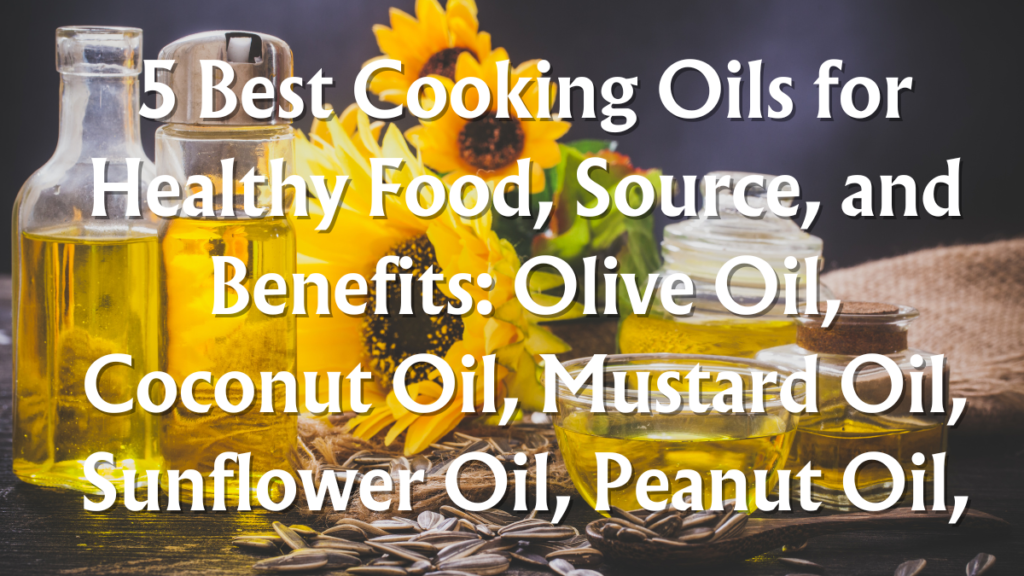
Understanding Different Types of Cooking Oils
Before delving into the specifics of olive oil, it’s crucial to recognize the diverse landscape of cooking oils. From coconut oil to avocado oil, each variant offers a unique set of flavors and nutritional attributes. Olive oil, particularly extra virgin olive oil, stands out for its distinct taste and numerous health benefits.
Healthiest Cooking Oils
Extra virgin olive oil, derived from the first pressing of olives, earns its place among the healthiest cooking oils. Packed with monounsaturated fats, antioxidants, and anti-inflammatory compounds, it contributes to heart health and overall well-being.
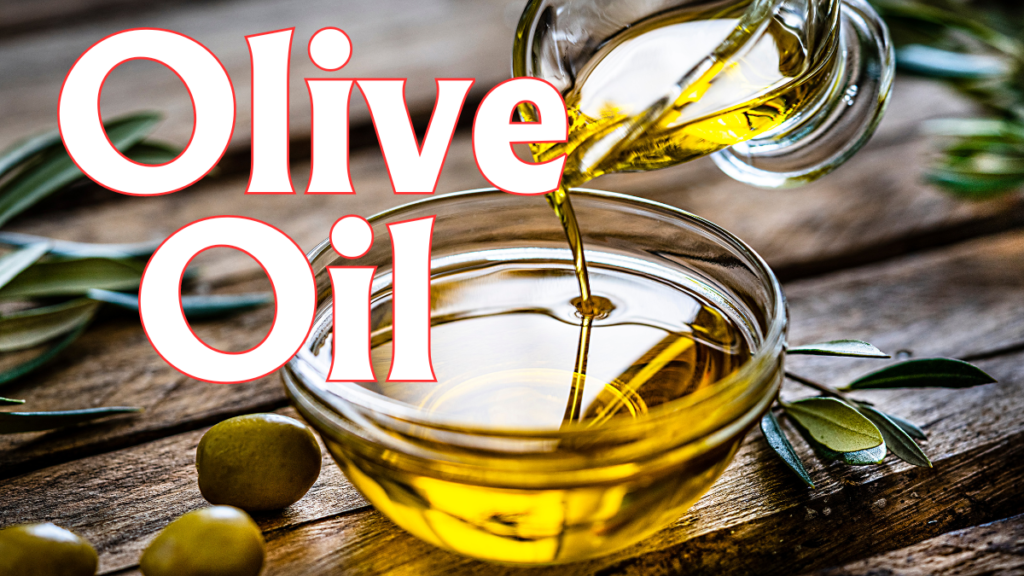
Benefits of Olive Oil
1. Heart Health and Monounsaturated Fats
– The high content of monounsaturated fats in olive oil supports heart health by reducing bad cholesterol levels and promoting a healthy cardiovascular system.
2. Antioxidant Properties
– Extra virgin olive oil is rich in antioxidants, such as polyphenols and vitamin E, which help combat oxidative stress and protect cells from damage.
3. Anti-Inflammatory Effects
– The anti-inflammatory compounds in olive oil contribute to reducing inflammation in the body, potentially lowering the risk of chronic diseases.
4. Improves Digestive Health
– Olive oil has been associated with improved digestive health, promoting the absorption of nutrients and supporting a healthy gut.
Incorporating Olive Oil into Your Culinary Repertoire
1. Salad Dressings and Marinades
– Create delicious and nutritious salad dressings by combining extra virgin olive oil with balsamic vinegar, herbs, and spices. Use it as a base for marinades to enhance the flavors of meats and vegetables.
2. Drizzling Over Vegetables and Pasta
– Elevate the taste of sautéed vegetables or pasta dishes by drizzling extra virgin olive oil before serving. Its rich flavor adds a delightful finishing touch.
3. Baking and Roasting
– Use olive oil in baking recipes, especially for Mediterranean-style bread or pastries. It can also be brushed over vegetables or meats before roasting to impart a golden crust and succulent texture.
4. Dipping for Bread
– Create a simple yet flavorful dip for bread by combining extra virgin olive oil with balsamic vinegar, garlic, and herbs. This classic Mediterranean appetizer is a crowd-pleaser.
Considerations for Olive Oil Usage
1. Quality Matters: Choose Extra Virgin
– Opt for extra virgin olive oil for the highest quality and maximum health benefits. This designation signifies the oil is cold-pressed and extracted without the use of heat or chemicals.
2. Storage in a Cool, Dark Place
– To preserve the freshness and prevent oxidation, store olive oil in a cool, dark place, away from direct sunlight. Use a tightly sealed container to protect it from exposure to air.
Conclusion
Olive oil stands as a culinary gem, offering a perfect blend of exceptional taste and health benefits. Whether used in salad dressings, sautéing, or baking, its versatility knows no bounds. As a source of heart-healthy fats and antioxidants, olive oil continues to reign supreme in kitchens worldwide.
FAQs:
1. Is olive oil suitable for frying?
– Yes, olive oil, especially extra virgin olive oil, is suitable for light frying and sautéing due to its moderate smoke point. However, for deep frying at high temperatures, oils with higher smoke points may be preferred.
2. What is the difference between extra virgin and regular olive oil?
– Extra virgin olive oil is the highest quality and least processed form, retaining more flavor and nutrients. Regular olive oil, often labeled as “pure” or “light,” undergoes more processing and has a milder taste.
3. Can olive oil be used for baking?
– Yes, olive oil can be used in baking, particularly in recipes where its distinct flavor complements the overall taste of the dish. It works well in bread, pastries, and cakes.
4. Is it necessary to refrigerate olive oil?
– Refrigeration is not necessary, but storing olive oil in a cool, dark place is essential to maintain its quality. Refrigeration can cause the oil to solidify, but it will return to its liquid state at room temperature.
5. Can olive oil be used as a replacement for butter in recipes?
– Yes, olive oil can be a healthy alternative to butter in many recipes. It adds a unique flavor and brings additional health benefits, especially in dishes where a mild, fruity taste is desirable.
Coconut Oil: Best Cooking Oils for Healthy Food, Source, and Benefits
Introduction
Coconut oil, derived from the kernel or meat of mature coconuts, has gained popularity for its unique flavor, versatility, and potential health benefits. In this article, we will explore the sources, benefits, and various culinary applications of coconut oil, highlighting why it has become a staple in kitchens worldwide.
Understanding Different Types of Cooking Oils
Before delving into the specifics of coconut oil, it’s essential to recognize the diverse landscape of cooking oils. From olive oil to avocado oil, each type brings distinct flavors and nutritional profiles to the table. Coconut oil stands out for its rich taste and its ability to withstand high temperatures.
Healthiest Cooking Oils
Coconut oil, particularly virgin or extra virgin coconut oil, is celebrated among the healthiest cooking oils. It contains medium-chain triglycerides (MCTs), and lauric acid, and has potential antimicrobial and antioxidant properties.
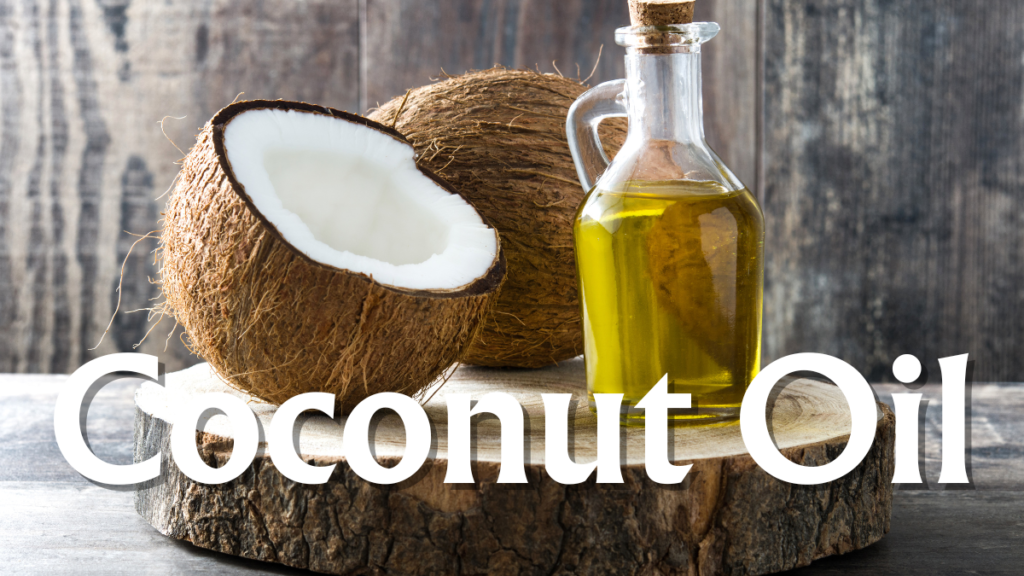
Benefits of Coconut Oil
1. Medium-chain triglycerides (MCTs) for Energy
– The MCTs in coconut oil are easily digestible and quickly converted into energy by the liver, making it a potential source of quick energy.
2. Lauric Acid for Heart Health
– Coconut oil contains lauric acid, a type of saturated fat that may raise good HDL cholesterol levels, supporting heart health.
3. Antimicrobial Properties
– The lauric acid in coconut oil has known antimicrobial properties, which may help combat harmful microorganisms and support immune health.
4. High Smoke Point for Cooking
– Coconut oil has a high smoke point, making it suitable for various cooking methods, including frying and sautéing, without breaking down its nutritional components.
Incorporating Coconut Oil into Your Culinary Repertoire
1. Cooking at High Temperatures
– Use coconut oil for high-heat cooking, such as stir-frying and deep-frying. Its high smoke point ensures that it remains stable and imparts a subtle coconut flavor to your dishes.
2. Baking and Roasting
– Incorporate coconut oil into baking recipes, where its distinct taste can complement sweet treats like cookies, muffins, and cakes. It’s also great for roasting vegetables, and enhancing their flavors.
3. Bulletproof Coffee or Tea
– Blend coconut oil into your morning coffee or tea for a boost of energy. The MCTs in coconut oil provide a sustained release of energy and may support mental clarity.
4. Smoothies and Dressings
– Add a spoonful of coconut oil to your smoothies for a tropical twist or use it in salad dressings to infuse a hint of coconut flavor into your greens.
Considerations for Coconut Oil Usage
1. Choose Unrefined or Virgin Coconut Oil
– Opt for unrefined or virgin coconut oil to retain the maximum nutritional benefits and coconut flavor. The refining process may strip away some of its natural compounds.
2. Moderation in Consumption
– While coconut oil offers health benefits, it’s essential to use it in moderation due to its high saturated fat content. Balancing it with a variety of oils in your diet is advisable.
Conclusion
Coconut oil’s distinct flavor and potential health benefits make it a versatile addition to various culinary creations. Whether used for frying, baking, or blending into beverages, coconut oil brings a touch of tropical goodness to your kitchen.
FAQs:
1. Can coconut oil be used for frying?
– Yes, coconut oil is suitable for frying due to its high smoke point. It imparts a mild coconut flavor to fried dishes and remains stable at high temperatures.
2. What makes coconut oil a healthy option?
– Coconut oil contains medium-chain triglycerides (MCTs), lauric acid, and potential antimicrobial properties. These elements contribute to its reputation as a healthful cooking oil.
3. Is there a difference between refined and unrefined coconut oil?
– Unrefined or virgin coconut oil is less processed, retaining more of its natural flavor and nutrients. Refined coconut oil undergoes processing that removes some of these compounds but gives it a milder taste.
4. Can coconut oil be used as a substitute for butter in baking?
– Yes, coconut oil can be a substitute for butter in many baking recipes, adding a unique coconut flavor. Adjust the quantity to achieve the desired taste and texture.
5. Does coconut oil contribute to weight loss?
– Some studies suggest that the MCTs in coconut oil may promote weight loss by increasing energy expenditure. However, it’s essential to consume coconut oil in moderation as part of a balanced diet.
Mustard Oil: Best Cooking Oils for Healthy Food, Source, and Benefits
Introduction
Mustard oil, derived from mustard seeds, holds a special place in culinary traditions across various cultures. Known for its robust flavor and potential health benefits, mustard oil adds a distinctive touch to a variety of dishes. In this article, we will explore the sources, benefits, and culinary applications of mustard oil, shedding light on its unique characteristics.
Understanding Different Types of Cooking Oils
Before delving into the specifics of mustard oil, it’s crucial to recognize the diverse landscape of cooking oils. From olive oil to coconut oil, each variant brings its unique set of flavors and nutritional attributes. Mustard oil stands out for its pungent taste and its use in traditional cooking practices.
Healthiest Cooking Oils
Mustard oil is celebrated as one of the healthiest cooking oils, boasting a nutrient-rich composition. It contains essential fatty acids, vitamins, and antioxidants, making it a valuable addition to a balanced diet.
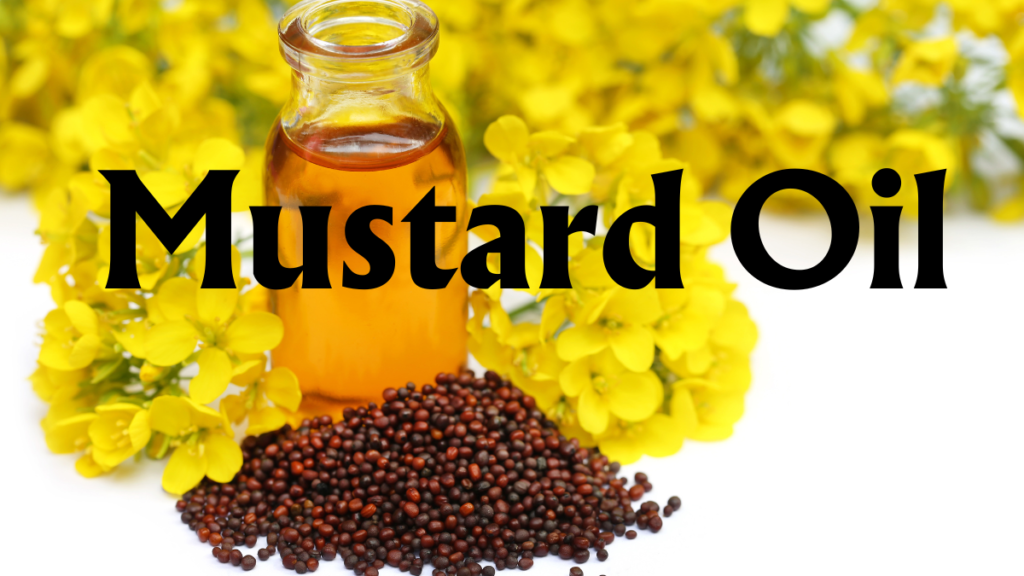
Benefits of Mustard Oil
1. Rich in Omega-3 Fatty Acids
– Mustard oil is a good source of alpha-linolenic acid (ALA), an omega-3 fatty acid that supports heart health and may have anti-inflammatory properties.
2. Antioxidant Properties
– The presence of antioxidants in mustard oil, including vitamin E, contributes to neutralizing free radicals and protecting cells from oxidative stress.
3. Potential Antibacterial and Antifungal Effects
– Mustard oil has been traditionally used for its antibacterial and antifungal properties. It may help combat harmful microorganisms, promoting overall health.
4. High Smoke Point for Cooking
– Mustard oil has a high smoke point, making it suitable for various cooking methods, including frying, sautéing, and deep frying, without compromising its nutritional content.
Incorporating Mustard Oil into Your Culinary Repertoire
1. Tempering in Indian Cuisine
– Mustard oil is commonly used for tempering in Indian cuisine. Heat the oil until it reaches its smoking point, add mustard seeds, and use the tempered oil to enhance the flavor of dals, curries, and vegetables.
2. Marinades for Meat and Seafood
– Create flavorful marinades for meat and seafood by combining mustard oil with spices, herbs, and citrus. The oil’s pungency adds depth to the marinade, resulting in richly flavored dishes.
3. Salad Dressings with a Kick
– Use mustard oil as a base for salad dressings to impart a bold and slightly spicy flavor. Combine it with vinegar, lemon juice, and seasonings for a zesty dressing that complements various salads.
4. Pickling and Preserving
– Mustard oil is a popular choice for pickling due to its unique taste. Its preservative properties help preserve the freshness of pickled vegetables, adding a distinct tanginess.
Considerations for Mustard Oil Usage
1. Cold Pressed or Unrefined Varieties
– Opt for cold-pressed or unrefined varieties of mustard oil to retain its natural flavor and nutritional benefits. The refining process may alter its taste and nutrient composition.
2. Heating to the Smoking Point
– Mustard oil is often heated until it reaches its smoking point before use. This process helps reduce its pungency and removes certain compounds. Use caution when heating to avoid inhalation of strong fumes.
Conclusion
Mustard oil, with its bold flavor and potential health benefits, offers a unique culinary experience. Whether used for tempering, marinating, or dressing salads, this oil adds a distinctive touch to a variety of dishes, contributing to both flavor and well-being.
FAQs:
1. Why is mustard oil heated to the smoking point before use?
– Heating mustard oil to its smoking point helps reduce its pungency and removes certain compounds. This process is often used in traditional cooking practices to enhance the flavor and aroma of the oil.
2. Can mustard oil be used for deep frying?
– Yes, mustard oil’s high smoke point makes it suitable for deep frying. It adds a unique flavor to fried dishes while maintaining its nutritional properties at high temperatures.
3. Does mustard oil have a strong taste?
– Yes, mustard oil has a strong and pungent taste. This distinctive flavor is a characteristic of the oil and contributes to its popularity in various culinary traditions.
4. Can mustard oil be used in salad dressings?
– Absolutely. Mustard oil adds a bold and slightly spicy flavor to salad dressings. Combine it with vinegar, lemon juice, and seasonings for a zesty dressing that complements a variety of salads.
5. Are there any health concerns related to mustard oil?
– Some people may be sensitive to the pungent compounds in mustard oil. Heating the oil to its smoking point is a common practice to reduce its pungency. As with any cooking oil, moderation is key in consumption. If you have specific health concerns, it’s advisable to consult with a healthcare professional.
Peanut Oil: Best Cooking Oils for Healthy Food, Source, and Benefits
Introduction
Peanut oil, extracted from the kernels of peanuts, is a versatile cooking oil known for its mild flavor and high smoke point. Widely used in various culinary traditions, peanut oil brings a distinctive taste to dishes while maintaining its nutritional benefits. In this article, we’ll explore the sources, benefits, and culinary applications of peanut oil.
Understanding Different Types of Cooking Oils
Peanut oil is among the diverse range of cooking oils, each with its unique set of flavors and uses. From olive oil to coconut oil, different oils contribute distinct tastes and characteristics to a variety of dishes. Peanut oil, with its neutral flavor and ability to withstand high temperatures, is a popular choice for frying and cooking.
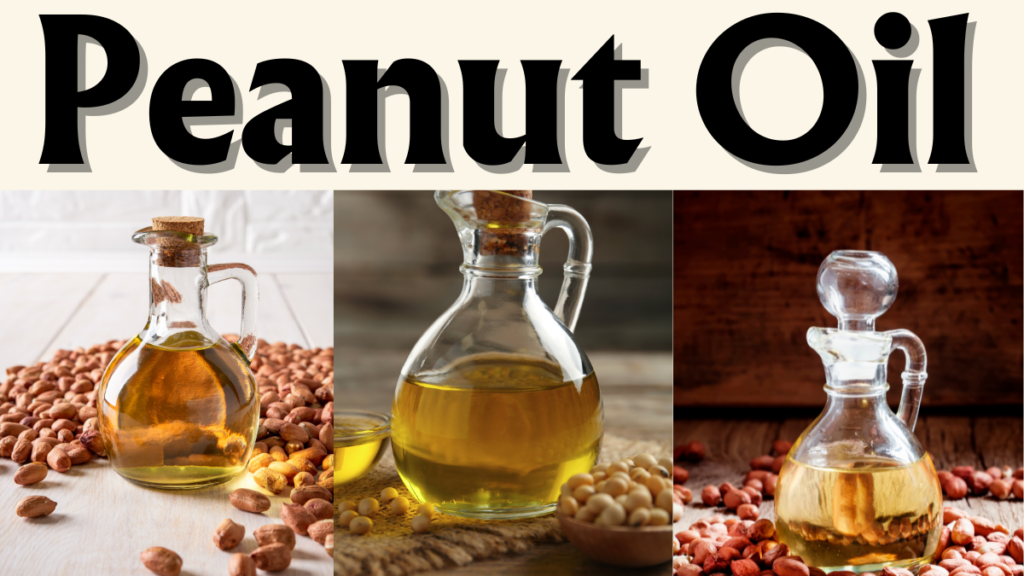
Benefits of Peanut Oil
1. High Smoke Point
– Peanut oil has a high smoke point, making it suitable for various cooking methods such as frying, deep-frying, and sautéing without breaking down or producing harmful compounds.
2. Neutral Flavor
– The mild and neutral flavor of peanut oil allows it to enhance the natural taste of ingredients without overpowering them, making it versatile for both sweet and savory dishes.
3. Heart-Healthy Monounsaturated Fats
– Peanut oil is rich in monounsaturated fats, which are considered heart-healthy. These fats may help reduce bad cholesterol levels and lower the risk of heart disease.
4. Vitamin E Content
– Peanut oil contains vitamin E, a powerful antioxidant that plays a role in protecting cells from damage caused by free radicals. It contributes to overall skin and immune system health.
Incorporating Peanut Oil into Your Culinary Repertoire
1. Perfect for Frying
– Utilize the high smoke point of peanut oil for deep-frying crispy foods like chicken, fries, or tempura. Its ability to withstand high temperatures results in a golden and crunchy texture.
2. Stir-Frying Delicacies
– Add peanut oil to your stir-fries for a light and nutty flavor. Its neutral taste complements a variety of vegetables, proteins, and sauces, allowing the natural flavors to shine.
3. Baking and Roasting
– Substitute peanut oil in baking recipes that call for vegetable oil or butter. It adds moisture to baked goods and imparts a subtle nutty essence. Additionally, use it for roasting vegetables to enhance their flavor.
4. Salad Dressings and Marinades
– Create flavorful salad dressings by combining peanut oil with vinegar, soy sauce, and spices. It also works well in marinades for meat, adding a hint of nuttiness to the dish.
Considerations for Peanut Oil Usage
1. Allergen Concerns
– Exercise caution when using peanut oil if there are known allergies in your household. While highly refined peanut oil is considered safe for most individuals with peanut allergies, it’s essential to be mindful of any potential sensitivities.
2. Choosing Refined or Unrefined
– Refined peanut oil has a higher smoke point and a more neutral flavor, making it suitable for high-heat cooking. Unrefined peanut oil, with a slightly nuttier taste, is better suited for lower-heat applications and dishes where the nutty flavor is desired.
Conclusion
Peanut oil, with its high smoke point, neutral flavor, and heart-healthy qualities, is a versatile cooking oil suitable for various culinary applications. Whether frying, stir-frying, baking, or dressing salads, peanut oil adds a distinct touch to dishes while promoting overall well-being.
FAQs:
1. Is peanut oil safe for individuals with peanut allergies?
– Highly refined peanut oil is generally considered safe for most individuals with peanut allergies. However, it’s essential to be cautious, and if there are concerns, consult with a healthcare professional.
2. Can peanut oil be used for deep frying?
– Yes, peanut oil is excellent for deep frying due to its high smoke point. It helps achieve crispy and golden results without compromising the oil’s quality.
3. What is the difference between refined and unrefined peanut oil?
– Refined peanut oil has a higher smoke point and a more neutral flavor, making it suitable for high-heat cooking. Unrefined peanut oil retains a slightly nuttier taste and is better suited for lower-heat applications.
4. Can peanut oil be used as a substitute for other cooking oils?
– Yes, peanut oil can be used as a substitute for vegetable oil or other neutral-flavored oils in various recipes. It imparts a mild and nutty taste to dishes without overpowering other flavors.
5. Is peanut oil a healthy choice for cooking?
– Yes, peanut oil is considered a healthy choice for cooking. It is rich in heart-healthy monounsaturated fats and vitamin E, making it a nutritious option for various culinary applications.
Sunflower Oil: Best Cooking Oils for Healthy Food, Source, and Benefits
Introduction
Sunflower oil and safflower oil, both derived from seeds of their respective plants, are popular cooking oils known for their light flavors and versatile applications. In this article, we’ll explore the sources, benefits, and culinary applications of sunflower oil and safflower oil.
Understanding Different Types of Cooking Oils
Sunflower oil and safflower oil belong to a diverse range of cooking oils, each contributing unique tastes and characteristics to various dishes. From olive oil to coconut oil, these oils offer distinct flavors and are widely used in different culinary traditions.
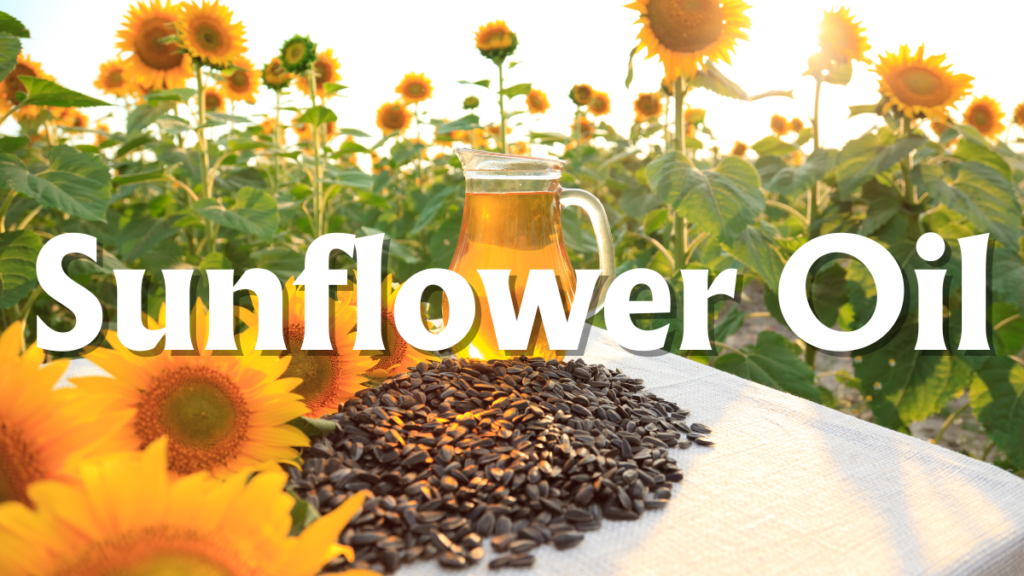
Benefits of Sunflower Oil
1. Heart-healthy polyunsaturated Fats
– Sunflower oil is high in polyunsaturated fats, particularly linoleic acid, which may contribute to heart health by reducing bad cholesterol levels.
2. Rich in Vitamin E
– Sunflower oil is a good source of vitamin E, an antioxidant that plays a role in protecting cells from damage caused by free radicals. It contributes to skin health and overall well-being.
3. Neutral Flavor
– Sunflower oil has a neutral flavor, making it suitable for a variety of dishes without overpowering the natural taste of ingredients. It is a versatile option for both sweet and savory recipes.
Incorporating Sunflower Oil into Your Culinary Repertoire
1. Frying and Deep Frying
– Sunflower oil’s high smoke point makes it suitable for frying and deep-frying. Its neutral flavor allows the natural taste of the ingredients to shine, resulting in crispy and golden textures.
2. Salad Dressings
– Create light and versatile salad dressings by blending sunflower oil with vinegar, mustard, and herbs. Its neutral taste complements a variety of salads and allows other flavors to stand out.
3. Baking
– Substitute sunflower oil for butter or other oils in baking recipes. Its neutral flavor ensures that it won’t overpower the sweetness of desserts, making it suitable for cakes, muffins, and cookies.
Benefits of Safflower Oil
1. High in Monounsaturated Fats
– Safflower oil is rich in monounsaturated fats, which can contribute to heart health by reducing bad cholesterol levels and promoting overall cardiovascular well-being.
2. Neutral Flavor
– Similar to sunflower oil, safflower oil has a neutral flavor, making it a versatile choice for various cooking applications. It enhances the natural taste of ingredients without dominating the dish.
3. High Smoke Point
– Safflower oil has a high smoke point, making it suitable for high-heat cooking methods such as frying, sautéing, and stir-frying. This quality allows for the retention of nutritional benefits and prevents the oil from breaking down.
Incorporating Safflower Oil into Your Culinary Repertoire
1. Stir-Frying and Sautéing
– Safflower oil’s high smoke point makes it ideal for stir-frying and sautéing. It imparts a light and neutral taste to vegetables, proteins, and grains, allowing the natural flavors to shine.
2. Marinades
– Use safflower oil as a base for marinades, especially for grilled meats or vegetables. Its neutral profile allows the marinade’s other ingredients, such as herbs and spices, to take center stage.
3. Mayonnaise and Creamy Dressings
– Safflower oil can be used to make light and creamy dressings, including mayonnaise. Its neutral flavor ensures that the dressing enhances rather than overpowers the taste of salads and sandwiches.
Considerations for Sunflower and Safflower Oil Usage
1. High Smoke Point
– Both sunflower and safflower oils have high smoke points, making them suitable for various cooking methods. This quality helps retain nutritional benefits and prevents the development of harmful compounds at high temperatures.
2. Neutral Flavor
– The neutral flavors of sunflower and safflower oils make them versatile choices for different dishes. However, this neutrality means that they won’t contribute distinctive flavors to the recipes.
Conclusion
Sunflower oil and safflower oil, with their high smoke points and neutral flavors, are excellent choices for a variety of cooking applications. From frying to baking, these oils enhance the natural tastes of ingredients, making them staples in many kitchens.
FAQs:
1. Can sunflower oil be used for deep frying?
– Yes, sunflower oil is suitable for deep frying due to its high smoke point. It helps achieve crispy and golden textures in fried foods without compromising the oil’s quality.
2. Is safflower oil a healthy choice for cooking?
– Safflower oil is considered a healthy choice for cooking due to its high monounsaturated fat content and neutral flavor. It can contribute to heart health and is suitable for various culinary applications.
3. Can sunflower oil be used in baking?
– Yes, sunflower oil can be used in baking as a substitute for butter or other oils. Its neutral flavor ensures that it won’t overpower the sweetness of baked goods.
4. Are there any specific health benefits of using safflower oil in cooking?
– Safflower oil is rich in monounsaturated fats, which are associated with heart health. Its use in cooking can contribute to a balanced diet, supporting overall well-being.
5. Can sunflower oil and safflower oil be used interchangeably in recipes?
– Yes, sunflower oil and safflower oil can often be used interchangeably in recipes due to their similar characteristics, including high smoke points and neutral flavors. However, it’s essential to consider specific recipe requirements and flavor profiles.
https://en.wikipedia.org/wiki/Cooking_oil
https://www.wikihow.com/Substitute-Coconut-Oil-for-Vegetable-Oil
- Unlocking the Goodness: 12 Amazing Benefits of Rice Bran Oil, Best Cooking Oils for Healthy Food, Source, and Benefits (Part 4)
- Flaxseed Oil: A Culinary Marvel for Health-Conscious Cooking – Source and Benefits Revealed! | 4 Amazing Benefits of Flaxseed Oil ( Part 3)
- Krill Oil: Best Cooking Oils for Healthy Food, Source, and Benefits (Part 2)
- List of Best Cooking Oils for Healthy Food, Source, and Benefits (Part 1)


